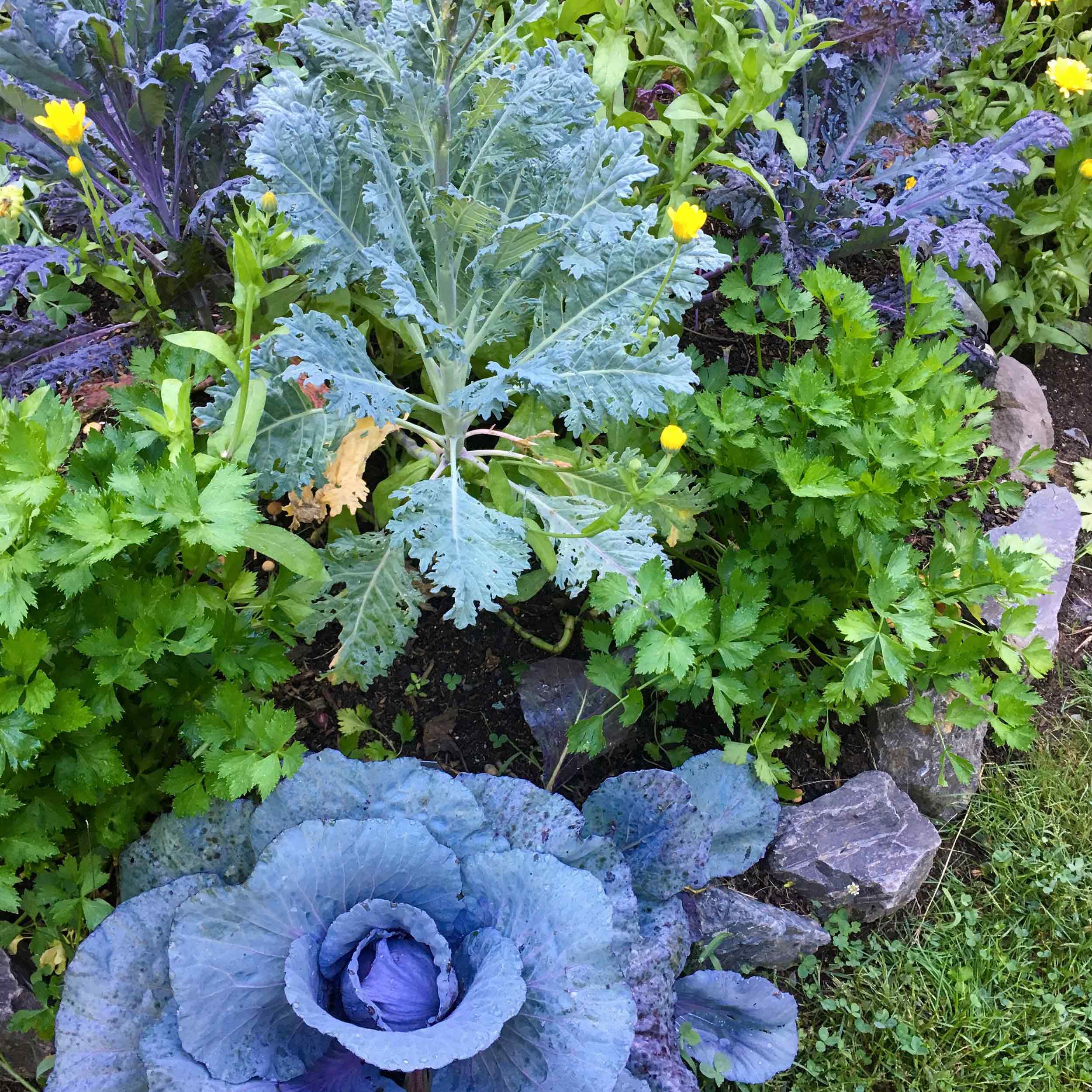Companion Planting
Imagine me and you…SOW happy together! Companion planting is what made me leave the land of straight and tidy rows and led me to my current jumble of garden happiness. As an organic gardener, you need to arm yourself with whatever tools are available in the battle against garden foes like the dreaded cabbage worm, or the beastly borers, or those huge, hulking hornworms. Interplanting with plants that not only get-along, but actually boost each other, definitely helps in the fight.
If ever in doubt, try following the old garden adage that states “Things that go together well in the kitchen, grow together well in the same garden bed.”
Below are a few of my favorite companion combinations:
BROCCOLI • KALE • ALYSSUM • CELERY • CALENDULA
• Celery, calendula, and thyme all repel the small white butterfly…that innocent-looking butterfly that is responsible for laying cabbage worm eggs on your plants.
CABBAGE • KALE • CHAMOMILE • SAGE • DILL
• Dill not only improves the growth of cabbage, it also attracts predatory wasps that target cabbage worms.
• Mint’s been said to give all brassicas a flavor boost.
• Chamomile boosts cabbage and kale’s health and growth.
• Sage wards off the small white butterfly.
CARROTS • ONIONS • RADISHES • ROSEMARY • LEEKS
• The pungent aroma of rosemary, onions and leeks repels carrot rust fly.
TOMATO • BASIL • BORAGE • ALLIUMS • CALENDULA
• Basil repels tomato pests like hornworms and aphids, while attracting bees to come hither and pollinate the tomatoes. Basil also improves not only the taste of the tomatoes, but the overall health of the plant as well. But it’s not a one-way street, tomatoes are said to improve basil’s taste too.
• Calendula and Borage nearby keeps tomato hornworms at bay and attracts pollinators.
PEAS • CARROTS • RADISHES • NASTURTIUMS
• Radishes and Nasturtiums repel cucumber beetles.
• Radishes also help break up the soil to allow carrot’s better germination and root formation.
SQUASH • NASTURTIUMS • THYME
• Nasturtiums and Thyme repel cucumber beetles and attract predatory insects.
THREE SISTERS (CORN • POLE BEANS • SQUASH)
• Pole beans grow up the corn and balance the soil after squash’s heavy feeding, while the squash controls the weeds.
BUSH BEANS • SUMMER SAVORY • ROSEMARY • CARROTS • CUCUMBERS
• Summer savory boosts carrot’s flavor and growth and helps repel pests.
• Carrots add a boost to the growth of bush beans.
• Bush beans and cucumbers benefit each other mutually.
• Rosemary wards off carrot rust fly.
A few favorite other companion powerhouses are:
CALENDULA…Calendula has also been the most-effective companion plant I’ve grown. If you only have space for one workhouse of a companion plant, then look no further than Calendula. I interplant it throughout my garden, but especially with my brassicas. It’s also fabulous with beans, cucumbers and tomatoes. Best of all, as it repels nasty whiteflies, cucumber beetles and aphids, it attracts beneficial insects creating a pollination heaven. Learn more about Calendula’s herbal offerings here.
CHIVES…this easy-peasy, pollinator-loving perennial, cousin to the onion, is a garden pal to carrots, beets, cucumbers, broccoli, tomatoes, peppers, squash and potatoes. Its aroma deters pests like aphids, cabbage worms, Japanese beetles, slugs and cucumber beetles. Carrots have shown improved taste and growth when sown with chives. Grown near roses, chives have been known to keep black spot at bay, while enhancing the rose’s growth. And it even helps control apple scab around fruit trees.
RADISHES…Sow a few radishes into every mound of squash and cucumbers and they’ll deter the cucumber beetle and squash bug. The key here is to leave those radishes in for the lifespan of your squash. Let them flower and go to seed, then nibble on their delectable, crispy seed pods.
AROMATIC HERBS…Thyme, sage, basil, chamomile, mint, and other aromatic herb’s essential oils act as a repellent to many garden pests like cabbage worms, hornworms and carrot flies. And while some lend a hand in pest control, other herbs actually help the growth and flavor of some veggies. Rosemary, sage and parsley all help deter nasty carrot flies.
Remember, for the most part, herbs and veggies that partner well together in the kitchen, grow well together in the garden.
Foes, not friends:
• Keep tomatoes away from dill, brassicas, corn and potatoes.
• Keep basil away from sage and rosemary.
• Keep brassicas (broccoli, cabbage, Brussels sprouts, cauliflower and kale) aways from strawberries, tomatoes and pole beans.
• Keep peas and beans away from alliums (onions, garlic, shallots, chives).
• Keep cucumbers and potatoes far apart.
If you’re looking for a great book to add to your garden library about companion planting, you must check out Carrots Love Tomatoes by Louise Riotte. For more garden books, please visit my list of FAVORITE READS.

